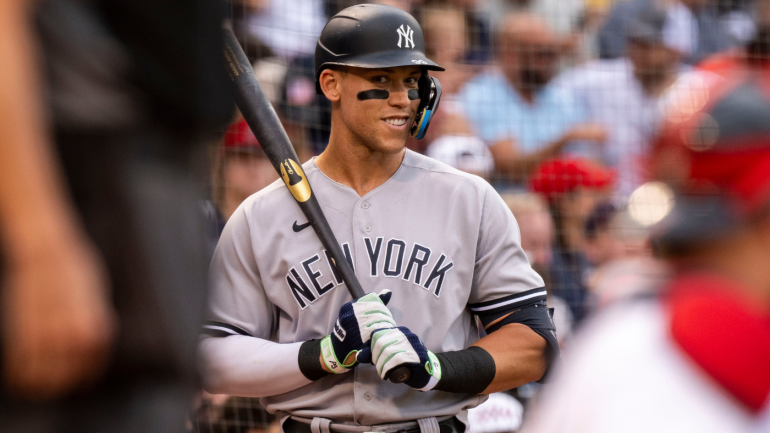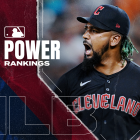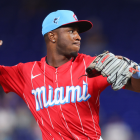
It would be difficult to have a better contract year than Aaron Judge. The New York Yankees star and AL MVP frontrunner is putting the finishing touches on a historic season, one that has him chasing a Triple Crown as well as Roger Maris' American League single-season home run record, and he's doing it right before free agency. Judge, who hit home run No. 60 on Tuesday night, has set himself up for a massive, massive payday.
"Very few people get this opportunity to talk extension. Me getting this opportunity is something special and I appreciate the Yankees wanting to do that," Judge said after rejecting a seven-year, $213.5 million extension in spring training. "But I don't mind going into free agency ... At the end of this year, I'll talk to 30 teams. The Yankees will be one of those teams."
We know the Yankees offered seven years and $213.5 million because GM Brian Cashman took the unusual step of announcing the offer terms during a press conference. Judge didn't seem to appreciate that -- "That's something I felt like was private between my team and the Yankees," he said -- and he sought 9-10 years at $36 million per year, according to the New York Post.
The Yankees made a reasonable offer in spring training and now, nearly six months later, Judge has done what once seemed impossible: he's earned himself more money. Teams pay for future performance, not past performance, though Judge has raised his perceived ceiling this year. No longer is he capable of "just" MVP-caliber seasons. He's capable of historic greatness.
"We think Aaron Judge is an all-time Yankee. We think he's a great player, beyond a great player. We think he's a great person. That's why we offered him the highest position player contract in the history of the Yankees," Yankees president Randy Levine said earlier this month. "I admire him that he went out and took this upon his shoulders and we'll sit down with him and hopefully figure it out. I think there's no question we want him back and no question we value him."
What has Judge's season done for his earning potential? Well, a lot. We know that much. Let's try to figure out what Judge's next contract could look like after the season he's having.
The extension offer, in context
The Yankees did not pull seven years and $213.5 million out of thin air. The extension would have begun in 2023 and the $30.5 million average annual value would have been the second richest ever for an outfielder, just above Mookie Betts and well below Mike Trout. Here are the richest outfield contracts in history:
| Total guarantee | Average annual value |
|---|---|
1. Mike Trout, Angels: $426.5 million | 1. Mike Trout, Angels: $35.54 million |
2. Mookie Betts, Dodgers: $365 million | 2. Mookie Betts, Dodgers: $30.42 million |
3. Bryce Harper, Phillies: $330 million | 3. Yoenis Cespedes, Mets: $27.5 million |
4. Giancarlo Stanton, Marlins: $325 million | 4. Kris Bryant, Rockies: $26 million |
5. Christian Yelich, Brewers: $215 million | 5. Bryce Harper, Phillies: $25.38 million |
The Yankees and Judge nearly went to an arbitration hearing this year (the two sides settled on a $19 million salary, the midpoint of their $21 million and $17 million filing figures) and, according to the New York Post, the Yankees were willing to give Judge the $21 million salary he sought in 2022 as part of the extension. The total package was eight years and $234.5 million.
All told, the Yankees offered to make Judge the second-highest-paid outfielder ever in terms of annual salary, and also give him the fifth-largest guarantee ever given to an outfielder. That said, neither the annual value nor the total guarantee would have been the richest in franchise history. Those belong to Gerrit Cole ($36 million annually and $324 million total). Also, Judge would have beaten Alex Rodriguez's 2008-17 contract in annual salary ($27.5 million) but not total guarantee ($275 million).
So, the Yankees did offer to make Judge one of the highest-paid outfielders in baseball, but they stopped short of making him the highest-paid Yankee, either on an annual basis or in terms of total dollars. He would have still been looking up at Cole despite being a homegrown superstar.
Contract length
Two things hold back Judge's earning potential: his age and his injury history. Judge will turn 31 shortly after Opening Day 2023, so, in all likelihood, his next contract will buy decline years in bulk. That's usually how it goes with long-term deals. Teams accept the bad years at the end for the elite years up front, and Judge is the best hitter in the sport right now.
As for the durability concerns, a variety of injuries limited Judge to 242 of 384 possible regular season games from 2018-20, or 63 percent. But aside from a 10-day COVID list stint last August, Judge has been perfectly healthy the last two years, so those injury concerns are pretty far back in the rear-view mirror. The most recent information is a dominant player who posts everyday.
The Yankees know Judge and his medicals better than anyone. They evaluated his age and injury history, and were still comfortable signing him through his age-37 season. And that's the number to focus on when examining contract length, the player's age. Here's how long several star players with long-term contracts are signed:
- Through age 39: Mookie Betts
- Through age 38: Bryce Harper, Mike Trout
- Through age 37: Gerrit Cole, Francisco Lindor, Corey Seager, Giancarlo Stanton
- Through age 36: Nolan Arenado
- Through age 35: Manny Machado, Fernando Tatis Jr.
Julio Rodríguez's new contract potentially ties him to the Mariners through age 38. Juan Soto rejected an extension that would have locked him up through age 38. That looks like the magic number: 38. That's the age the best of the best, the game's truly elite players (Betts, Trout, etc.), are either signed through or are expected to be signed through.
The Yankees offered Judge a seven-year contract covering his age 31-37 seasons and, frankly, the Yankees would probably get off easy if all they have to do is tack on one extra year to loop in his age 38 season. Given the season he's having, Judge has all the leverage he needs to request a contract that takes him through age 39, similar to Betts.
Similar star players signed contracts through their age 38-39 season either as free agents, or when they were very close to free agency. Even though he'll play most of 2023 at age 31, that gives Judge and his representatives enough justification to seek at least an eight-year deal this winter taking him through 38, if not a ninth year through age 39.
Average annual value
Mets owner Steve Cohen and Max Scherzer did Judge (and all players, really) a huge favor by raising the average annual value bar so much this past offseason. Here are baseball's richest contracts in terms of average annual salary:
- Max Scherzer, Mets: $43.33 million
- Gerrit Cole, Yankees: $36 million
- Mike Trout, Angels: $35.54 million
- Carlos Correa, Twins: $35.1 million
- Stephen Strasburg, Nationals: $35 million
- Anthony Rendon, Angels: $35 million
Just like that, the salary for elite players jumped from $35 million or so per year to $40-plus million per year. Scherzer received that record-shattering $43.33 million annual salary as part of a three-year deal, but eventually someone is going to get $40 million per year on a long-term contract. Why not Judge? He's as good a candidate as anyone, especially if wins he wins the Triple Crown and/or sets a new AL single-season home run record
At this point it's hard to imagine Judge signing for less than Cole's $36 million per year. The precedent has been set for a star player getting $40-plus million per season and Judge seeking that would not be unreasonable. It may not happen, but his camp throwing that number out there during contract talks would not be outlandish. That is now the going rate for best in the league players.
Judge's salary scale is no longer dependent on other outfielders. He's earned the right to have his salary based on what the sport's other great players are making, regardless of position. That means Scherzer and Cole are benchmarks, Correa and Rendon too. Judge can point to those Correa and Rendon and say I'm better than them, so pay me more.
Marquee value
This is difficult to quantify as outsiders but it is exists, and it works both ways. The Yankees derive value from Judge beyond his on-field contributions. He puts butts in the seats, drives television ratings, sells merchandise, the works. The Yankees will have paid Judge about $35 million in salary by time this season ends and he has generated multitudes more in revenue for the franchise.
At the same time, being a Yankee helps Judge. It equals endorsement opportunities (Judge had more endorsement deals than any other player in 2021) and all sorts of other benefits that come with being a star athlete in New York. The New York market comes with benefits that just don't exist anywhere. With all due respect, a star Yankee is more famous than a star anything else in baseball.
The Yankees baked Judge's marquee value into the cake when making their extension offer and they'll do it again after the season, and Judge will consider it while fielding calls. It could make financial sense to take, say, $1 million less per year to remain with the Yankees than join another team just because the off-field opportunities are so great. Marquee value is a major consideration.
An opt-out clause
The Yankees popularized the opt-out clause years ago, when they gave CC Sabathia an opt out three years into his initial seven-year, $161 million deal with the team. Cashman said they included the opt out to give Sabathia peace of mind, that if he didn't enjoy his time in New York, he could leave (Sabathia later leveraged that opt out into an extension). Since then opt outs have become commonplace. If you want a premier free agent, you'll probably have to give him an opt out.
An opt out is certainly possible with Judge, though his age makes it less appealing to him and lowers its value. Give Judge an opt out, say, two years into his next contract, and he would go back into free agency prior to his age-33 season. Players rarely get paid big at that age. Judge could be the exception, but chances whatever remains on his next contract will be more lucrative than any new money he could get at age 33.
For that reason, an opt out is an easy concession to make for interested teams. If Judge wants the ability to re-enter free agency at age 33 or 34 (or later), then let him. The market is unkind to players that age (JD Martinez was very productive from 2018-21 and he still passed on multiple opt outs) and it might even serve as an escape hatch to avoid his deep decline years.
The X-factor
The X-factor is free agency itself, which is unpredictable. You can look at contract projections and predictions until you're blue in the face. At the end of the day, players take the best offer more often than not. They don't sign the contract you get when you average out all the projections. They take the outlier deal, the one that is larger than the rest.
And to get that outlier contract offer, all it takes is one desperate general manager and/or owner. The best recent example of this is Robinson Canó. The Mariners, so desperate to return to the postseason, offered Canó a 10-year deal worth $240 million in 2013. The Yankees had the next best offer. It was seven years and $175 million. The outlier contract won the bidding war.
The Angels are up for sale and who's the say the next owner won't want to make a big splash? The Nationals are for sale too. Spending huge on Judge so soon after trading Soto (and given the state of the team) may seen unwise, but who knows? The next owner could want to grab headlines the way the Padres did in 2015, under their new ownership.
We can safely assume Judge is looking for the largest contract possible and that he won't take a Correa-esque short-term contract that kicks the can down the road another year. It's hard to imagine Judge raising his free agent stock next year. This is almost certainly his best chance at a monster payday, so come in with an outlier offer, and he can be yours.
The bottom line is once Judge hits the market and actually becomes a free agent, the chances he returns to the Yankees go down. At that point any team can throw its hat in the ring and, at minimum, force the Yankees to up their offer. And Judge seems willing to play the game. He didn't dismiss signing with the Red Sox recently and I'm sure we'll hear him connected to the Mets soon after free agency begins. All bets are off once Judge is a free agent. If Freddie Freeman can leave the Braves, Judge can absolutely leave the Yankees.
So what's it going to take?
The Yankees offered seven years and $30.5 million per season covering 2023-29. Now it appears eight years and $37 million per season covering 2023-30 ($296 million total) could be what it'll take just to get your foot in the door to discuss a contract. That takes Judge through his age-38 season, the same as Harper and Trout, and the $37 million annual salary tops Cole as the second highest ever.
A hometown discount is always possible, though passing up $213.5 million in spring training is pretty strong evidence Judge wants to maximize his earning potential, and is willing to bet on himself. Judge is so close to free agency now that why wouldn't he test the market and see what's out there? There's no good reason not to shop around, even if the plan (hope) is to ultimately remain in New York.
"His interest, as he's conveyed to me, is he doesn't want to be anywhere else," Cashman said in spring training. "But at the same time, he knows there are no guarantees."
Judge benefits from being a Yankee, no doubt, but the Yankees need Judge more than Judge needs the Yankees. He is far and away their best player on the field as well as their biggest draw off the field. The total package is irreplaceable. There will be no other player available this winter (as a free agent, anyway) who produces so much positive value to the organization.
When the Yankees really want a player, they get him. They offered Cole a seven-year deal three years ago, and when the Angels and Dodgers came in with seven-year offers, they upped it to eight. And when the Angels and Dodgers put eight years on the table, the Yankees went to nine. My hunch is they would've gone to 10 years to get Cole, if that's what it took. Point is, when the Yankees have their heart set on a player, they do what it takes to get him, and all indications are they want to keep Judge.
Big-market clubs like the Cubs, Mets, and Red Sox figure to at least check in on Judge, potentially giving him the leverage to push the Yankees to a ninth year. Unless he does something unexpected like take a high dollar short-term deal, I don't think $40 million per year will happen, but again, free agency is unpredictable. Nine years and $38 million per year, or $342 million total, is where this bidding war may end up. Judge has done that much to raise his free agent stock.


















